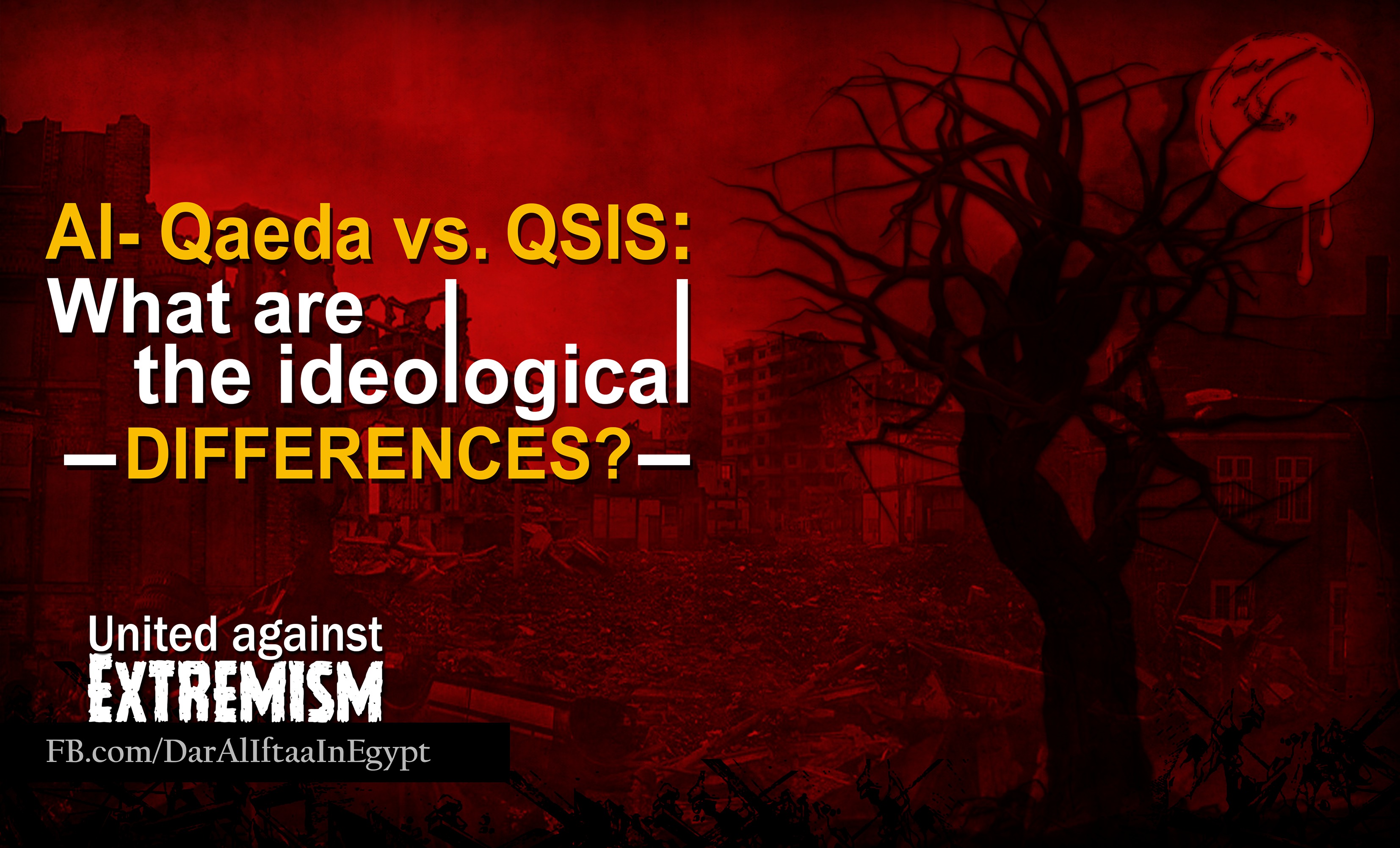Al- Qaeda vs. QSIS: What are the Ideological Differences?

The fatwa monitoring observatory at Egypt’s Dar al-Ifta in its 17th report focused on the intense ideological battle taking place between terrorist organizations. This comes against the backdrop of the extreme state of polarization between the self-proclaimed jihadi movements and groups across the world.
The report titled “The clash between infedilizing organizations: its features, reasons and ramifications” said that the achievements of QSIS [ISIS] on the ground have ignited a war that pitted infedilizing organizations against each other in a battle for territory domination and control over minor infedilizing groups across the Middle East. This comes as part of their persistent attempts to assert what they call the ‘international jihad movement’.
The report analyzed the content of more than 90 hours of audio recordings of the leaders of these groups and conducted an in-depth analysis of their ethics through their websites.
The report elucidated that the conflict between al-Qaeda and QSIS first began in Syria after the latter separated from al-Qaeda and proclaimed a caliphate state, a move which Ayman al-Zawahiri denounced. As the conflict escalated, the two parties announced their strong opposition to each other and the war between them spilled over onto websites and infidelizing forums with fighters from either sides trading accusations and insults, demonstrating their ideological differences. QSIS described al-Zawahiri as a senile sheikh and accused al-Qaeda leaders of deviating from what it called the ‘jihadi methodology’. According to QSIS, al-Qaeda no longer represents the core of ‘global jihad’ and their leaders will bring about the destruction of the Islamic state project and the caliphate. Al-Zawahiri’s response was peremptory; he accused QSIS of being a deviant group, competitive and of ‘declaring states without taking permission’.
Al-Nusra Front, an al-Qaeda affiliate, described QSIS as a ‘tyrant group’ that must be fought while supporters of QSIS regard al-Nusra as betrayal awakenings.
The report added that QSIS is waging fierce battles against al-Nusra Front, al-Qaeda’s wing in Syria, that have so far resulted in the deaths of thousands after Al-Nusra Front accused it of being ‘created’ by the Syrian regime and of executing its goals.
Outlining the reasons behind the conflict between the two organizations, the fatwa monitoring observatory at Dar al-Ifta noted the doctrinal differences between them. One such difference is how each organization perceives others who contradict their beliefs and ideas which they deem to be the absolute truth. Al-Qaeda [the mother organization] accuses its adversaries of fisq while QSIS deems them apostates and infidels who must be fought.
The report further mentions that QSIS has surpassed al-Qaeda in terms of its scale of takfir, resulting in a shift from traditional jihadi ideology towards embracing a takfiri ideology that is clearly evident in their unrestrained killing of adversaries.
The report added that one point of contention between QSIS and al-Qaeda is the issue of bay’a [pledging allegiance]. In their battle for a caliphate, al-Qaeda defended its entitlement to al-bay’a from all other jihadi groups. QSIS, on the other hand, does not believe itself to be an offshoot of al-Qaeda and that, since it is the group that has declared the Islamic caliphate, al-Qaeda leaders and its members must give their bay’a to the caliph, Abu Bakr al-Baghdadi, because he is a Qurashite.
Another core difference, the report added, is that QSIS takes a rigorous stand against other sects and religions all of whose members they deem to be infidels and therefore must be fought. Al-Qaeda believes that it is necessary to differentiate between Islamic sects and other religions.
According to al-Qaeda, Shi’ite and Alawite scholars and leaders are apostate infidels. Their masses however are not declared infidels except after establishing the proof upon them. As far as al-Qaeda is concerned, the people of other religions such as Christians and Yazidites are basically infidels though they are not to be fought except if they are they in state of war with Muslims. Other than these, are to pay jizya.
The report elucidated that the two organizations adopt different strategies toward the ‘near enemy’ and the ‘far enemy’. Al-Qaeda’s war is mainly directed against ‘far’ enemies — the US and its allies. However, QSIS launches direct attacks against surrounding countries — the ‘near enemy’ in Arab and Islamic countries and never against Europe or the US.
According to the fatwa monitoring observatory at Dar al-Ifta, the logistic reasons for the conflict between QSIS and al-Qaeda include a battle for influence and domination over the global jihadi arena, funding, the ability to recruit new jihadists, position and high standing among militant organizations. Each organization furthermore attempts to win over local jihadi groups.
The report stressed that the ideological and doctrinal divide and power struggle between the two groups are expected to intensify. In addition, there is a strong possibility of a break out of bloody clashes between QSIS and al-Qaeda loyalists especially after the termination of the military operations by the coalition forces. This means that a war between the terrorist groups will supplant the war on terrorism.
The report stressed that this scenario has played out once before in Afghanistan after the termination of military operations against the Soviet Union in the late eighties. The struggle there was turned into inter-jihadist clashes which eventually led to the fragmentation and deterioration of militant groups there.
The fatwa monitoring observatory concluded its report by saying that the violent clashes between these militant infedilizing groups show, if nothing else, that the leaders of these organizations have no interest in the inflated slogans they use to recruit new combatants. Their greatest concern is supremacy; they change their loyalties according to their interests and not in favor of those who share their beliefs and principles.
 Arabic
Arabic French
French Deutsch
Deutsch Urdu
Urdu Pashto
Pashto Swahili
Swahili Hausa
Hausa
